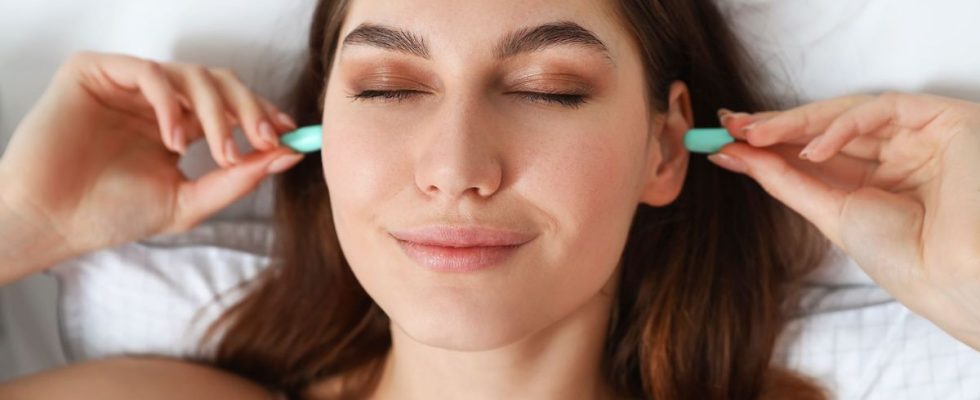Published on
Updated
Reading 4 min.
Finding silence with foam plugs, wearing lenses, or a splint against bruxism, these are some habits that allow you to find daily comfort. But when these small devices are poorly maintained or used incorrectly, they can be dangerous.
Comfort sometimes doesn’t depend on much: lenses to see more clearly, a hearing aid to hear better or earplugs to be quiet, a splint to soothe your teeth at night… Many of us benefit from at least one device of this type in our daily life. But did you know that they can also put us at risk? In an article in the Daily Mail of January 9, several doctors recall the basic rules for avoiding infection.
Braces can cause pneumonia
Whether it is to replace a tooth (or several), wearing a dental prosthesis could well cause you harm if you do not clean your appliance properly. According to a study carried out in 2023 by Cardiff University, not regularly cleaning dentures increases the risk of pneumonia. Dentures provide a surface for disease-causing organisms to colonize before traveling to the lungs via saliva.
It is therefore essential to have good oral hygiene: either brush your teeth twice a day with fluoride, and use dental floss so that dental plaque or food debris does not get stuck between the dentures and the teeth.
Likewise, it is advisable to remove dentures and clean them twice daily with a designated toothbrush and a non-abrasive cleanser.
Mouthguards and aligners that prevent nighttime teeth grinding (called bruxism) can also become a breeding ground for bacteria that cause cavities and gum disease, as well as sore throats, nausea and infections. pulmonary. At the origin of this particular risk, bacteria easily attach to their rough surface. “Run them under water and clean them with a toothbrush and toothpaste” say the experts.
Earplugs, hearing aids and headphones can damage your ears
Wearing devices in your ears can also harm you in the long term.
- So, hearing aids Worn inside the ear tend to trap air and create a warm, humid environment conducive to bacterial and fungal infections in the ear canal, the tube that runs from the outer ear to the eardrum. “It is therefore important to take a break from wearing them”explains to the English daily Professor Simon Lloyd, consultant ear, nose and throat (ENT) surgeon at Manchester Royal Infirmary.
- Regular use of earplugs overnight can also push earwax into your ear, creating hearing problems and experts advise not plugging your ears for prolonged periods, “because moisture rises in the ear and this can predispose you to infections”, explains Nicholas Eynon-Lewis, an ENT surgeon in London. He recommends removing them just before bed and replacing disposable ones after a few days.
- Headphones for music or earbuds worn inside the ear can also pose a hearing risk and cause tinnitus if used at high volume, due to damage to the hair cells in the inner ear. A recent international BMJ study found that adolescents and young people are at serious risk of hearing loss from listening to music at a volume of up to 105 decibels. Prolonged use can also push earwax into the ear and cause blockage, a common cause of temporary hearing loss.
It is therefore advisable not to use these headphones too much and to clean them regularly using an alcohol wipe.
Eye lenses causing keratitis
On the vision side, hygiene is also required. Contact lenses float on a thin film of tears on the cornea, the clear front part of the eye. A 2022 study by Moorfields Eye Hospital in London found that people who wore reusable contact lenses (changed monthly, usually made from silicone hydrogel) were almost four times more likely than those who wore disposable lenses. (also made from silicone hydrogel) from developing Acanthamoeba keratitis, a painful infection of the cornea that can lead to vision loss. This occurs due to exposure to amoebae found in water sources such as swimming pools and tap water.
“It is a pathology which generally affects the eye unilaterally, of infectious origin. Professor Brézin, head of the ophthalmology department at Cochin hospital in Paris, told us in June 2022. “It almost exclusively affects contact lens wearers due to lens miswearing, in almost all cases. This can be cleaning with tap water, swimming in fresh water…”.
The amoeba, which is a parasite found in tap water or fresh lake water, will then develop between the cornea and the lens, which acts like a “bandage” which slows down the feeling of pain. symptoms. “Damages are parasites, their action is sneaky because they quickly attack the eye and are quite difficult to eradicate, some keratitis takes months to heal..
“There is also a risk of corneal abrasion – scratching the eye with a fingernail when putting in or taking out lenses. And according to a 2018 study by the U.S. Centers for Disease Control and Prevention, sleeping with contact lenses in place can increase your risk of eye infection eight-fold.
Anti-snoring devices can hurt you
Finally, while 40 to 60% of men snore in France, the solution found with the nasal dilator should not be taken lightly. This small, flexible plastic device placed in the nose helps keep the nostrils open, making breathing easier. But for Dr M. Eynon-Lewis warns: “Be careful not to force them too far into the nose as this may cause nosebleeds and inflammation.”.
